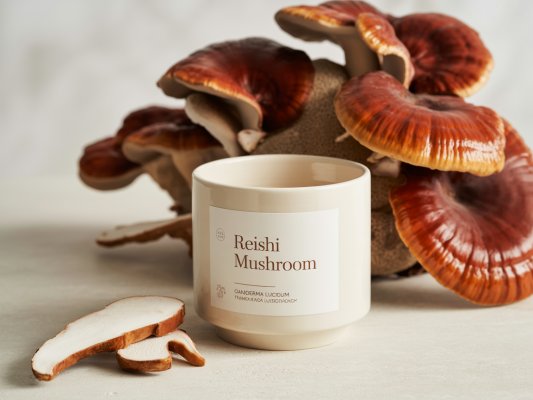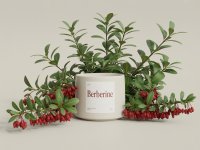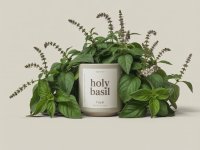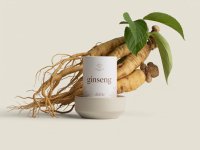
Reishi Mushroom
Description
Reishi mushroom (Ganoderma lucidum), known as "Lingzhi" in China, is a fungus revered in Eastern medicine for millennia. It's recognized for its potential to promote longevity, boost the immune system, and support overall well-being. This article provides a comprehensive yet accessible overview of Reishi, covering its benefits, uses, potential side effects, and scientific evidence.
Quick Overview: Reishi Mushroom At-a-Glance
- Key Benefit(s): Potentially boosts immune function and offers antioxidant support.
- Primary Mechanism: May modulate the immune system through polysaccharides and triterpenes.
- Best For: Individuals seeking immune support and general well-being, though clinical evidence is still developing.
- Typical Dose Range: 1400-5400mg daily, often divided; extracts may require lower doses.
- Key Caution/Consideration: May increase bleeding risk; consult a healthcare provider before use, especially if on medications.
Table of Contents
Categories & Effectiveness
Learn about our rating methodologyMood & Stress
Wellbeing Boost
3/10Limited evidence of effectiveness
Physical Performance
Blood Sugar Support
5/10Moderate evidence of effectiveness
Systemic Health
Immune System Boost
7/10Strong evidence of effectiveness
Immune System Balance
6/10Moderate evidence of effectiveness
Liver Protection
6/10Moderate evidence of effectiveness
Systemic Antioxidant
6/10Moderate evidence of effectiveness
Dosage & Side Effects
Recommended Dosage
Potential Side Effects
Bioavailability & Half-Life
Interactions & Stacks
Recommended Products
Host Defense MycoBenefits Beauty Capsules - Supplement for Healthy Hair & Nail Strength - Skin Elasticity & Health Aid - Mushroom Supplement with Biotin & Hyaluronic Acid - 60 Capsules (30 Servings)
- Rated 4.7 stars by 24 customers
- Premium quality ingredients
Ellie's Best 7 Mushroom Powder Extract Blend Supplement - Organic Reishi, Lion's Mane, Chaga, Turkey Tail, Cordyceps, Maitake & Shiitake - Double Extracted - 16oz / 456 Servings…
- Rated 4.5 stars by 213 customers
- Premium quality ingredients
Laird Superfood Organic Performance Mushroom Blend with Chaga, Cordyceps, Lion's Mane and Maitake for Energy and Cognition, 3.17 oz. Bag, Pack of 1
- Rated 4.3 stars by 2,620 customers
- Premium quality ingredients
As an Amazon Associate we earn from qualifying purchases. Prices and availability are accurate as of the date/time indicated and are subject to change.
Benefits by Use Case
Immune System Support
Reishi may enhance immune function by stimulating immune cells and modulating cytokine production. However, human studies are limited and further research is needed to confirm these effects.
User Review:
Cellular immunity in 80% of patients was significantly enhanced in terms of elevated plasma interleukin (IL)-2, IL-6, and interferon γ (IFN-γ) levels and natural killer (NK) cell activity
Adjunct Cancer Therapy
Some studies suggest that Reishi, when used alongside conventional cancer treatments, can enhance tumor response and improve quality of life. However, it is not a first-line cancer treatment and more data are needed.
User Review:
Patients who had been given G. lucidum alongside with chemo/radiotherapy were more likely to respond positively compared to chemo/radiotherapy alone
Blood Sugar Regulation
Animal studies indicate that Reishi may help lower blood glucose levels and improve insulin sensitivity. Human trials are needed to confirm these findings and establish safe and effective dosages.
User Review:
Oral administration of G. lucidum hot water extract was found to lower the serum glucose levels in obese/diabetic (+db/+db) mice
Liver Protection
Animal studies suggest Reishi may protect against liver injury induced by toxins. Further research is needed to determine if these effects translate to humans.
User Review:
Hot water and water–ether extracts of the fruit body of G. lucidum were found to have a potent hepatoprotective effect on liver injury induced by carbon tetrachloride (CCl4) given orally and intraperitoneally to rats
Antioxidant Support
Reishi contains compounds with antioxidant properties, which may help protect cells from damage. However, the direct impact on human health requires further investigation.
User Review:
Antioxidants from lingzhi were found to be absorbed quickly after ingestion, resulting in an increase in the plasma total antioxidant activity of human subjects
Mechanism of Action
Frequently Asked Questions
Where to Buy Reishi Mushroom
Based on quality, price, and customer reviews, here are our top recommended Reishi Mushroom supplements:
Ellie's Best 7 Mushroom Powder Extract Blend Supplement - Organic Reishi, Lion's Mane, Chaga, Turkey Tail, Cordyceps, Maitake & Shiitake - Double Extracted - 16oz / 456 Servings…
- Rated 4.5 stars by 213 customers
- Premium quality ingredients
Host Defense MycoBenefits Beauty Capsules - Supplement for Healthy Hair & Nail Strength - Skin Elasticity & Health Aid - Mushroom Supplement with Biotin & Hyaluronic Acid - 60 Capsules (30 Servings)
- Rated 4.7 stars by 24 customers
- Premium quality ingredients
Laird Superfood Organic Performance Mushroom Blend with Chaga, Cordyceps, Lion's Mane and Maitake for Energy and Cognition, 3.17 oz. Bag, Pack of 1
- Rated 4.3 stars by 2,620 customers
- Premium quality ingredients
As an Amazon Associate we earn from qualifying purchases. Prices and availability are accurate as of the date/time indicated and are subject to change.
Summary & Expert Opinion
- Key Strengths: Reishi shows promise in modulating the immune system and possesses antioxidant properties. It has a long history of traditional use.
- Key Weaknesses: Many purported benefits lack robust human clinical trial data. Product standardization is a concern. Potential side effects and drug interactions exist.
- Recommendation: Consider Reishi as a complementary approach to support immune function and overall well-being, but always consult a healthcare professional before use, especially if you have existing health conditions or are taking medications. Be cautious about exaggerated claims and prioritize high-quality, reputable brands.
For those seeking a deeper understanding, the scientific landscape surrounding Reishi mushroom is complex and nuanced. Its diverse array of bioactive compounds, including polysaccharides and triterpenes, are thought to interact with various biological pathways.
- Immunomodulation: Research suggests that Reishi polysaccharides can stimulate immune cell activity and modulate cytokine production. In simple terms, it may help the body's defense mechanisms function more effectively. However, the specific receptors and signaling pathways involved are still under investigation.
- Antioxidant Activity: Triterpenes and other compounds in Reishi exhibit antioxidant properties in vitro, meaning they can neutralize free radicals in a test tube. However, whether these effects translate to significant antioxidant protection in the human body remains to be fully established.
- Other Potential Mechanisms: Some studies suggest Reishi may influence blood sugar levels, protect the liver, and even possess anti-cancer properties. However, these findings are often based on animal models or cell culture studies, and more rigorous human trials are needed to confirm these effects and understand the underlying mechanisms.
- Quality Control: The wide variability in triterpene and polysaccharide content in commercial Reishi products is a significant concern. Key for You: Choose products from reputable manufacturers that provide standardized extracts and third-party testing to ensure quality and potency.
- The Bottom Line: Reishi mushroom holds potential as a health-promoting agent, but it's essential to approach it with informed caution. While traditional use and preliminary research are encouraging, more high-quality human studies are needed to fully understand its benefits, risks, and optimal uses.







